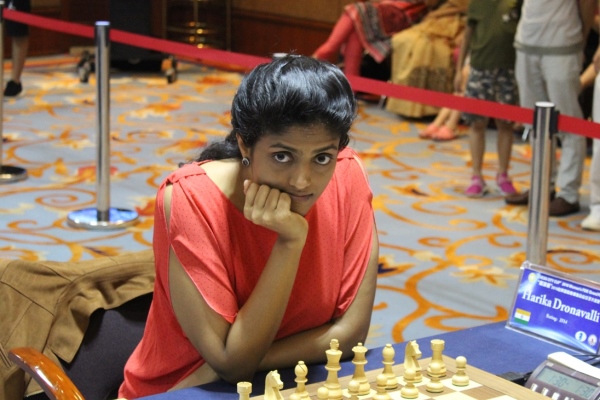In the high-stakes world of competitive chess, grandmasters are often depicted as solitary figures, locked in profound strategic battles. Yet, sometimes, life`s profound realities find a way to grace the chessboard, adding layers of unexpected depth to the game. Such is the narrative unfolding in Chennai, where Indian Grandmaster Harika Dronavalli is making her mark not just with her tactical prowess, but with the heartwarming presence of her two-year-old daughter, Hanvika, by her side at the prestigious Chennai Grand Masters tournament.
A Mother`s Gambit: Sharing the Chessboard with Hanvika
For Harika, 34, her current participation in the Challengers section of the Chennai Grand Masters is more than just another tournament; it`s a deeply personal milestone. While she famously captured headlines in 2022 by competing in the FIDE Olympiad in Mahabalipuram while heavily pregnant – an event that saw India secure its first-ever women`s Olympiad medal – this return to Chennai brings a different, equally significant, first. It marks the inaugural occasion Hanvika, who is nearing her third birthday, is witnessing her mother navigate the intricate world of international chess.
“I made her sit on the board, move the pieces. That felt good,” Harika shared, a subtle smile undoubtedly playing on her lips. “It`s been 25 years since I started playing chess in the international arena. It`s a nice feeling that my daughter is coming and witnessing what I am doing in my life.”
This sentiment encapsulates a beautiful fusion of two demanding roles: that of an elite athlete and a devoted mother. The sight of Hanvika observing her mother`s domain offers a fresh perspective on what dedication truly entails.
Beyond the Board: Balancing Ambition and Affection
The decision to bring Hanvika to Chennai wasn`t made lightly. While the proximity to her Hyderabad home made logistics feasible, it represented a conscious choice to redefine her pre-game routines. “I think any mother can relate to this,” Harika reflected. “Guilt happens when you leave your child back. I would love to have her everywhere.” It’s a candid acknowledgment of the perpetual balancing act faced by professional mothers everywhere—the yearning to be fully present in both their children’s lives and their careers.
Despite the inherent logistical “hassle” of traveling with a toddler, Harika embraced the challenge. The mild weather and familiar food of Chennai made it an ideal testing ground for this new approach. “I`m happy she could witness my life in a way,” she noted, underscoring the precious rarity of such opportunities when a major tournament is hosted on home soil.
The Current Battle: Performance Amidst Purpose
On the competitive front, Harika has faced a tough start, dropping her initial two games in the Challengers section against strong, young Grandmasters Diptayan Ghosh and P Iniyan. However, her perspective remains refreshingly grounded. Her pre-tournament expectations were less about immediate results and more about gauging her standing within a robust field. “It`s okay, even if I play good or bad, I just want to have fun, that`s it,” she asserted, revealing a mature approach that prioritizes enjoyment and experience over the relentless pressure of victory.
The Ascendance of Indian Women`s Chess
Harika`s journey is set against the backdrop of a phenomenal year for Indian women`s chess. The qualification of Divya Deshmukh (FIDE World Cup winner) and Koneru Humpy (runner-up) for the women`s Candidates tournament has ignited national pride. While praising Divya`s “massive achievement,” Harika holds a particularly resonant admiration for Humpy. Drawing parallels with her own experiences, Harika highlighted the immense difficulty Humpy faced:
“I know how commendable [it is] for Humpy to reach the final. With having a kid, family, so many responsibilities, the way she fought was just amazing… This is something that people should really understand, it is much more difficult for Humpy with her circumstances to still be there and be in the final.”
This camaraderie among elite female chess players, particularly those navigating motherhood, speaks volumes about the shared challenges and triumphs in a sport traditionally dominated by men.
A Long-Awaited Spotlight
For Harika, this current era of chess, with its newfound attention in India, is a dream realized. She recalls years of striving, of reaching semifinals and winning bronze medals with little public recognition. “I never felt dejected,” she affirmed. “I knew it will eventually grow. I believed our sport will also grow. I`m happy that at least I`m somewhere near to that era, and it didn`t happen after I finished my career.”
As the Grand Masters tournament continues, Harika Dronavalli embodies more than just a competitor; she is a testament to perseverance, a symbol of evolving gender roles in sport, and a loving mother sharing her life`s passion with the next generation. In Chennai, the grand master of the 64 squares is also a grand master of life, offering a powerful, poignant reminder that some of the most profound victories are those won off the board, in the quiet moments shared with a curious two-year-old.

